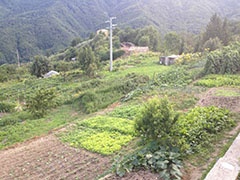The following story was originally published on the BioMed Central blog. The piece highlights research findings from a recent Open Access article that was coauthored by IFPRI senior research fellow Siwa Msangi.
Climate change is already putting food security at risk. Rising temperatures and extreme events, such as sudden droughts and floods, mean that it will be even harder to meet the growing demand for food, fiber and fuel, especially for poor countries with high population growth.
Unless immediate action is taken by policy-makers, the impacts on livelihoods will increase over the long-run, especially if agriculture expands onto wild-lands that now provide natural resources such as clean water and biodiversity.
Research must be at the heart of decision-making for dealing with climate change, so that realistic scenarios, risk analysis and trade-offs become part of planning and financial investments intended to build adaptation and resilience for agriculture. Active involvement of researchers is key to building the capacity to affect much-needed changes in human behavior and social infrastructure.
Fortunately, climate-smart agriculture (CSA) has now become a global policy initiative for economic development, poverty reduction and food security; enhancing the productivity and resilience of natural and agricultural ecosystem functions. This builds natural capital and reduces trade-offs involved in meeting these goals.
Today, the journal Agriculture and Food Security published an open-access scientific article, reporting on strategies for building resilience, adaptation and mitigation for the world’s agricultural systems that were issued at the 2013 Global Science Conference on Climate-Smart Agriculture . Researchers, government officials, policymakers, representatives from NGOs and stakeholders from around the world met to examine current gaps in knowledge, existing work within CSA, and agendas for interdisciplinary research and science-based actions.
Scientists from many disciplines contributed to this article, such as crop and animal physiologists, hydrologists, soil scientists, ecologists, sociologists, political scientists, economists, and geographers. Their endorsement of CSA indicates the huge potential for engaging more scientists in developing the knowledge that will promote adaptation and resilience, and when feasible, greenhouse gas mitigation.
The article shows that when interdisciplinary science is conducted with stakeholder partnerships, then solutions are both pertinent to specific situations and have more benefits for local communities.
Enactment of climate-smart agriculture
Climate-smart agriculture aims to deliver a global triple win for productivity, adaptation and, ultimately, mitigation of greenhouse gases that cause global warming.
Emerging trade-offs, need to be managed in locally appropriate ways. For example, in Brazil, pasture reclamation and adoption of integrated crop-livestock systems, such as rotational grazing or introduction of nitrogen-fixing legume pasture, keeps pastures productive for grazing animals and permits high stocking rates. This reduces the pressure for deforestation, so that carbon stocks are maintained in trees and soils.
CSA makes sense for farmers because they make money, save money or save time. At the same time CSA makes sense to consumers and food businesses because it means long-term sustainability of supply chains. As an example, if investments are made to prevent flooding and salt water intrusion in the Mekong River Delta in Vietnam, then high-profit shrimp farming will be more resilient, and in turn, the industry will have greater financial capacity to support local adaptive changes that ensure consistent production and exports.
CSA applies to farmers’ fields, but also to landscapes. It incorporates the interface of agriculture and forestry, as well as wetland and marine systems. Management across the whole landscape is crucial to balance trade-offs.
In Kenya, research is underway on improving different types of agroforestry systems for food and timber in the diverse landscapes populated by smallholders that support home gardens, plots for food and cash crops, pasture, woodlots, and native forests. The research programs also include analysis of the complex tradeoffs involved in land use decisions and ways to provide financial rewards to local communities for the biodiversity, carbon storage, and increased soil quality that result from this landscape diversification.
This article forms a stepping stone for future action in CSA.
The article in Agriculture and Food Security indicates that momentum that has already built among the science community for CSA, forming a solid foundation for greater engagement by more researchers in fundamental and applied studies. Open access publishing plays a crucial role in this momentum, bringing research and information to policy discussions, and to the farmers who will to implement CSA-based methods.
This is an exciting time for developing priorities, scientific engagement and funding to support the knowledge needed for policymaking decisions. During 2014, several international organizations, like the Food and Agriculture Organization of the United Nations and the research program on Climate Change, Agriculture and Food Security within the Consultative Group for International Agricultural Research, are working to define the knowledge agenda of the Global Alliance for Climate-Smart Agriculture, which will be launched at the UN Secretary General’s Climate Summit in New York City on 23 September 2014.
Following up on the journal article in Agriculture and Food Security, and the CSA conference in Davis, California, the next Global Conference on Climate-Smart Agriculture will be held in Montpellier, France in 2015.







